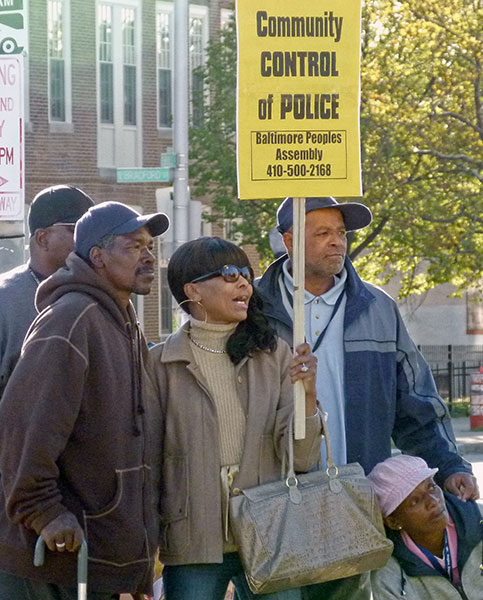

East Baltimore, Oct. 13.WW photo: Joseph Piette
On Oct. 13, community activists along with friends and families of victims of police brutality gathered for the East Baltimore Peoples Assembly for Justice for Anthony Anderson Sr. The outdoor assembly took place on the vacant lot by a makeshift memorial marking the spot where Anderson was brutally killed in front of family members by three Baltimore undercover police officers on Sept. 21.
The police claim that Anderson “choked and died after trying to swallow a bag of drugs” was exposed as a lie on Oct. 2 with the release of an official autopsy showing Anderson died from a ruptured spleen caused by “blunt force trauma” that broke as many as ten ribs. No drugs were found in his system.
The Baltimore Peoples Assembly, organized earlier this year in response to growing police terror, conducted its own investigation of witnesses who described how the police ran up behind Anderson, grabbed him around the knees, hoisted him in the air and brutally slammed him to the ground.
Anderson was the thirteenth person killed by Baltimore police since January 2012. The city has paid out nearly $17 million over the last two years in police brutality settlements. It spent another $10.4 million defending lawsuits in court. Meanwhile, much needed recreation centers are being closed because the city claims it lacks funds.
Gathering participants from as far away as Virginia and Pennsylvania, the East Baltimore Peoples Assembly was the second such community gathering this year to address the growing epidemic of police abuse in Baltimore. As with the first Assembly in June, the moving testimony from community members was a clarion call to action.
The Rev. Cortly “C.D.” Witherspoon, a BPA organizer and president of the Baltimore chapter of the Southern Christian Leadership Conference, opened the rally in what he called “the Anthony Anderson Field.” Witherspoon told those gathered, “We know why we are here. Black women are being strip searched on the streets; drug dealers are being robbed by members of the Baltimore Police Department. Every single month we’ve been at a vigil or a rally for someone killed by the police. Our communities are under assault and we won’t take it anymore!”
Marcella Holloman described the killing of her son, Maurice Donald Johnson, by Baltimore police at her home on May 19. Holloman called the police when her mentally ill son began to exhibit erratic behavior. Since Johnson’s episodic illness was registered in the police data base she expected they would take him to the hospital for treatment. But rather than waiting for an ambulance, the two responding officers entered Holloman’s home where Johnson was sequestered and shot him three times.
Renee Washington, whose fiancée was brutally beaten and killed by three Baltimore police officers in 2001, told the crowd, “The police are not in our neighborhoods to protect us. They are here to take us out, one by one, the men first.”
Nakia Washington, whose boyfriend was killed in March by police who shot him six times in the chest, condemned the BPD’s practice of giving paid leave to officers under investigation for brutality. “The cops kill a Black man and they get a paid vacation — what kind of message is that?” Washington said. She urged people to speak up about what’s happening in their communities. “It won’t stop happening unless you stand up.”
The outraged community has called for the jailing of the three Baltimore police officers — Todd A. Strohman, Gregg Boyd and Michael Vodarick — who killed Anderson and then lied about it.
Members and friends of the Anderson family were at the EBPA. Anderson’s younger brother, Leon Anderson, described his own experience with police harassment while driving-while-Black. “It doesn’t matter where I am in Baltimore. Every time I turn around the same police officer is giving me a traffic ticket. We need to come together and put an end to this madness.”
Sharon Black, a BPA organizer, urged people to come out on Oct. 17 when BPA activists will confront the Police Department over the confirmation of Anthony Batts as Baltimore’s new police commissioner.
As chief of police in Oakland, Calif., Batts presided over numerous problems of police brutality and abuse. In January, U.S. District Judge Thelton Henderson warned that the Oakland Police Department would be placed under federal control unless the Department sped up the pace of its reforms. Black told those assembled, “We need to give Batts the kind of welcome that he’ll know that police brutality and terrorism will not be tolerated in Baltimore City.”
She urged people to carry cameras as they patrol their communities to record police harassment and terrorism. “We have the power to take back our communities, to get the occupiers out — from the rich running things in City Hall to the pit bull police they’ve put out in our streets. We demand community control now!”
As part of Workers World newspaper’s coverage marking the 50th anniversary of the liberation of…
From the PFLP Central Media Office The following statement from the Popular Front for the…
Newark, New Jersey Over 250 people, representing over 250 New Jersey endorsing community groups, attended…
Special to Workers World The following is a press release issued on April 24, 2025,…
dear Larry Krasner, we heard you sued Elon Musk over his corrupt million election giveaways…
Unions join forces against harassment and deportation of members When 200 immigrant workers – from…